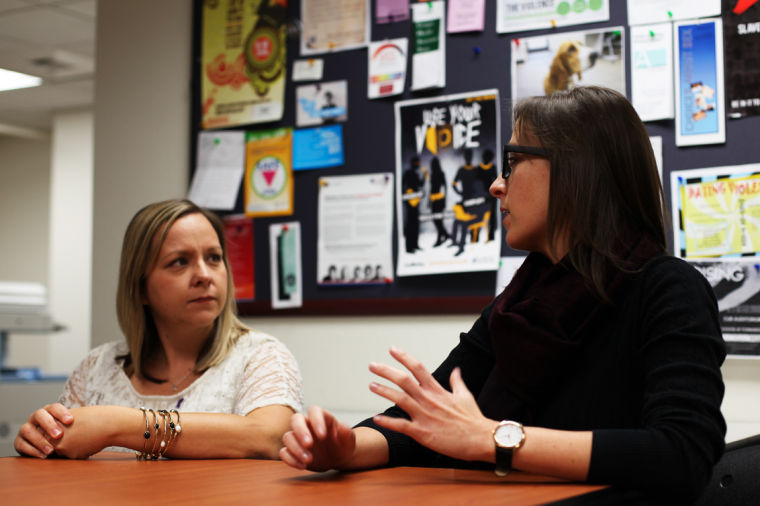Fighting the Violence
Nikki Finnestead (left) and Amber Morczek (right) discuss the resources available for victims and witnesses of relationship violence at the Violence Protection Center in the Washington building, Wednesday, Oct. 9, 2013.
October 10, 2013
October is Domestic Violence Awareness Month, and WSU’s Violence Prevention Programs (VPP) is spreading the word.
Nikki Finnestead, violence prevention coordinator at VPP, said this month is an excellent opportunity to highlight issues of relationship violence on campus.
“We know that our data indicates that thousands of WSU students have been in abusive relationships, and those figures are consistent with universities around the country,” Finnestead said.
The results of the National College Health Assessment indicate approximately 2,300 WSU students experienced emotionally abusive relationships within the last 12 months.
The results also indicate approximately 400 students in physically abusive relationships and more than 300 in sexually abusive relationships.
About 1,400 students reported having been stalked.
Paula Adams, health promotion coordinator at Health and Wellness Services, wrote the grant to start the violence prevention programs.
“The purpose of that grant was to expand funding into resources that would advance a broader campus climate for violence prevention,” Adams said. “We have collaborators all around campus.”
Three years ago, VPP launched the Green Dot program, a program that educates on recognizing and preventing violence, specifically relationship violence.
VPP presentations include training on what relationship violence looks like, what to do as a friend on the outside and what resources are available to victims.
Relationship violence includes dating violence, stalking and sexual assault, and can be directed at women and men in heterosexual or same-sex relationships, Finnstead said.
She expressed disappointment that students entering college accept violence in our society as a norm. She said gender-based violence should not be considered normal.
“For me, it really revolves around the idea of normalcy,” she said. “We see it. We hear about it in the news. We just expect violence is going to happen. We don’t want normal to look like that. We want normal to be a positive, healthy experience.”
VPP encourages outside friends to listen, talk about situations and withhold judgments, even if the victim becomes defensive.
“Recognize you’re on the outside,” Finnestead said. “This is why we put such an emphasis on withholding judgments.”
She said relationship abuse is not necessarily physical in nature; emotional, verbal and sexual abuse are more difficult for outsiders to recognize.
“I think we should be turning the focus away from ‘Why doesn’t she just leave?’ to ‘Why is this person doing that to their partner?’” Finnestead said.
Finnestead is proud of VPP’s expansion and its environmental approach to finding resolutions. For the first time, the program presented to all of this summer’s Alive! groups.
“We spent a half an hour with all the incoming undergrads, educating them on recognizing relationship violence,” Finnestead said. “Many students were thankful for that information, to know where we were and what we do in our programs.”
Amber Morczek, a graduate assistant at VPP, volunteered to present at the Alive! sessions. After presenting to one group she visited the Art Walk, where a male incoming freshman approached her.
Morczek said he passionately thanked her for presenting.
“He said he felt like the information was going to help him over the next four years,” Morczek said. “Then, his mom stepped in and said he was reciting statistics, facts and the information from the presentation verbatim.”
Morczek described how excited she was to hear positive feedback from students.
“It was empowering. The work we’re doing is impactful. It’s good to know that even hearing information second-hand is powerful” she said.
Finnestead said VPP is about empowering other students to become aware of and involved in solving the issue, she said.
Finnestead said VPP is devoted to empowering other students, spreading awareness and getting others involved in solving the issue.
The VPP office is staffed by two graduate assistants and an undergraduate employee. Students volunteer at the center’s events.
Related resources in Pullman include Alternatives to Violence on the Palouse (ATVP), the Office for Equal Opportunity at WSU and the Pullman and WSU police departments. ATVP has a second office within VPP to meet with students.
For more resources on identifying dating violence, where to report incidents and for confidential resources and counseling, visit sexualassault.wsu.edu.





















